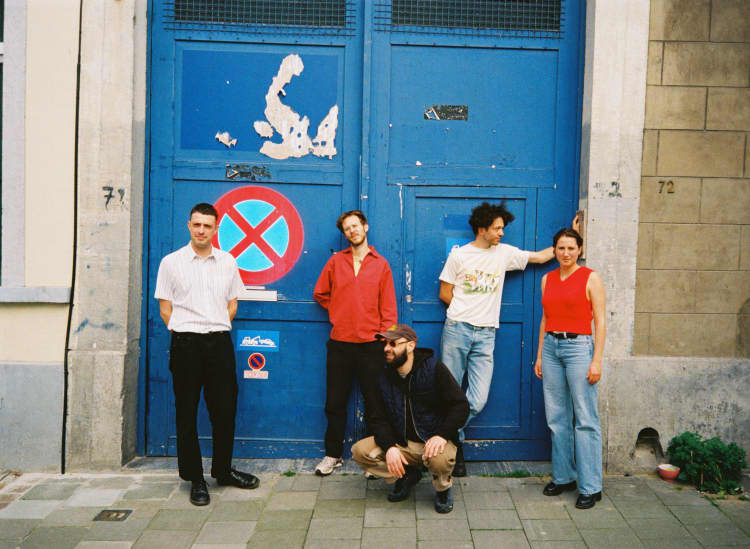Another Dancer’s missing connections
The Belgian weirdo pop band refuse to settle on one sound — and that suits them just fine.

The Opener is The FADER's short-form profile series of casual conversations with exciting new artists.
It’s a bright afternoon in the neat Belgium apartment of Dries Robbe, the principal singer-songwriter of Another Dancer, and he’s already thinking about the project they’ll release after their debut album, I Try To Be Another Dancer, out on September 10 via Bruit Direct Disques and Aguirre Records. “One of the main problems we have right now is naming a genre for the music,” Robbe says of the group’s already-completed, as-yet-untitled second project; his bandmates, Margo Mot and Mike Crabbé, nod in agreement over our video call. I Try To Be Another Dancer has a similarly intentional nebulousness — the listener is left looking for some word to describe the singular universe they’re hearing, joining its creators on their ever-expanding search.
For now, the record store bins in our mind demand something clinical to describe I Try To Be Another Dancer, so “collage radio rock” it is. A union of disparate elements can also be found in the biographies of Another Dancer’s three principal members: Dries spent years creating music in his bedroom, driven by a love of Arthur Russel and J Dilla (I Try To Be Another Dancer is his first-ever release, and he describes holding its test pressing as the best day of his life). Mike is a mixer and producer who’s spent years performing in punk, dub, and electronic acts across Brussels’s underground music scenes. Margo, a filmmaker by trade, only dabbled in music before reconnecting with Dries, an acquaintance from childhood, over bands they loved.
Margo describes her dynamic with Dries as a “ping-pong,” and their volley sparked the beginning of Another Dancer. Dries would send Margo songs from his vast vault, some dating back to his teenage years, and she would offer suggestions to improve them. “At first,” Dries says, “the music was even more lo-fi.”
Mike, who joined soon after, helped them articulate their wealth of ideas. “When I made these songs, you could think that we're like 10 different bands,” Dries says. “Mike made it more coherent.” Margo agrees, crediting the mixing process with “taking a lot of things away, giving more space.” Lucas Schreel and Timo Vantyghem joined the band after their first album’s completion, adding a new degree of exciting uncertainty to what may come.
In making I Try To Be Another Dancer, Dries says the band wanted to create a “mixtape vibe.” Across nine tracks, Another Dancer twist the dial until various signals blur into a unique new frequency, strangely cohesive in spite of its distinct elements. Lead single “Overfriendly Dogs” behaves like a dream-pop answer to the trend of austere spoken-word post-punk, Margo and Dries’s bantering vocals layering over each other to evoke a light-hearted incantation between friends. Margo’s love of Stereolab can be most deeply felt on dreamier tracks like “Salto Mortale” and "Middelmatig Mirakel," while “Time Sense” has the quality of a Daniel Johnston demo tape fished out of a reliquary for the brokenhearted. But what the songs are saying is less important than the space they evoke: an art-pop haven for oddballs in their most vulnerable and contradictory moments.
Billing their sound as “utopian music” in a press release, the band explains that they’re more interested in creating something they haven’t heard before than pursuing a lofty ideal. “We try to make very human music,” Dries says. “There's a lot of mistakes. Everything's not written in key. When I make something, I don’t have a final form that I have in mind; it's more like all a bunch of ideas.” Margot draws a connection to her other creative outlet: “I'm not that into narrative filmmaking,” she explains, “and I think Another Dancer is a bit the same.”
The “anything goes” sound of I Try To Be Another Dancer is a reflection of Brussels. The Belgian capital faces many of the same challenges as other cities, like ascendant right-wing political parties and broken-down public services (Mike is 15 minutes late to our interview thanks to delayed public transit). But thanks in part to a still-reasonable cost of living, Dries sees a silver lining: “There's so much chaos that it creates energy,” he muses, “energy that connects.”
That power can be found in the city’s flourishing DIY spaces, where the gigs have lineups that cross genres. “I do feel like there is a Brussels sound that’s slower in general,” Mike says. “A lot of music I encounter is weird or absurd. If you get used to all of these sounds and you start combining them in your head, you’ve already made the connection.”
Like most freshly developing brains, Another Dancer aren’t done making connections. When I ask about the direction of their next album, they laugh with an almost shy exasperation that quickly changes into enthusiasm. There’s dub, and disco. Some ambient, of course, as well as “‘80s-style guitar ballads.” Not knowing what’s next, whether it’s with their sound or their hopes for a wild, unpredictable live show, is the band’s heart. “I think that's the beauty about Another Dancer — that we're all open for whatever it can become,” Mike says. “That’s the fun part.”




